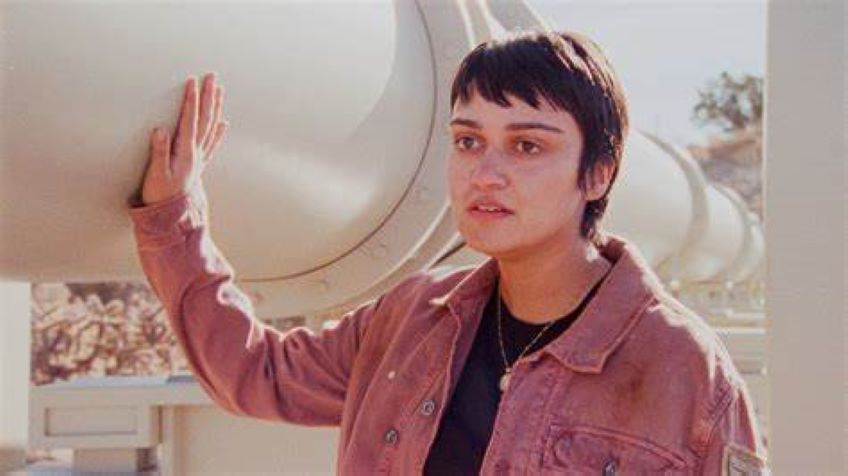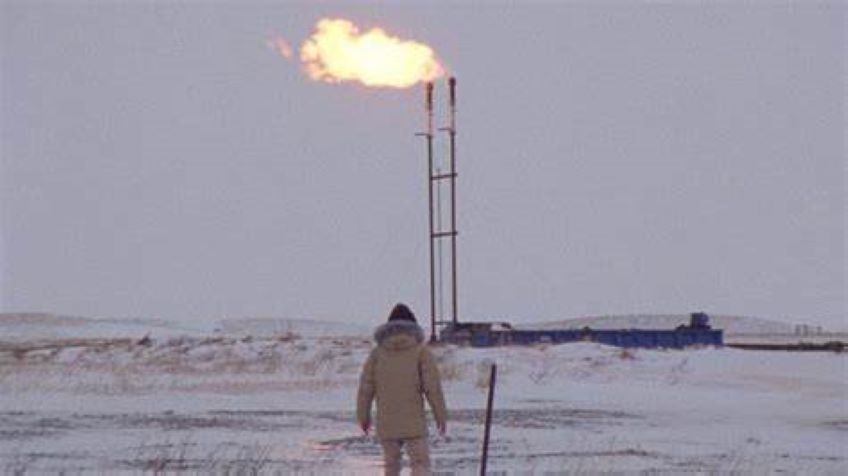Joyce Glasser reviews How to Blow Up A Pipeline (April 21, 2023) Cert 15, 104 mins.
The subject is hot, the title is in-your-face fabulous, the trailer is wild and the notion of applying the heist or assassination film procedural to climate activism seems topical, edgy and even courageous. With Sasha Lane playing a lead role in this band of youth-against-the-establishment theme, hopes are raised for an American Honey of idealists rather than lost souls. The film, by the promising techno-thriller director Daniel Goldhaber (Cam) is based on the hot-off-the-press book by climate activist Andreas Malm who controversially argues for non-pacifistic campaigning. In short, How to Blow Up A Pipeline is a film that promises much.
While Daniel Goldhaber will not win any editing awards, you cannot blame him for the choppy scenes, narrative confusion and lack of tension unless he were co-directing. There’s nothing wrong with Tehillah De Castro’s cinematography if you concede that sun-drenched is the order of the day in West Texas. By process of elimination you want to blame it on the acting, but in fairness, there is not much meat on the bones for this ensemble cast.
First-time script writer Ariela Barer (who has a leading role in the film as Xochitl), Jordan Sjol and Goldhaber co-write a script that never stood a chance. The build-up, often the most fun part of the heist film, where the participants are recruited for their particular expertise (think, Day of the Jackal) is all but omitted. What’s left is a quick succession of tiresome scenes where the team is briskly introduced, only to be reintroduced in longer flash-back scenes, breaking the continuity. The “how to” middle is confusing, the execution of the plan lacks suspense and the aftermath is prolonged and muddled.
One problem with the adaptation is that in the book, Malm devotes the first two of his three sections to discussions of the pros and cons of violent and non-violent activism, whereas here, the superficial discussions are crammed into about five minutes of dialogue. By the time we meet the team, they are die-hard violent protesters, although one character Alisha (Jayme Lawson), seems to go along to keep her lover Theo (Sasha Lane) company.

Everyone else has a reason to want to take revenge on the oil industry, like the suspects in an Agatha Christie mystery. But it supposedly starts with Theo and Xochitl, two best friends in their twenties from Long Beach, California where huge oil refineries and the cars and diesel freighters they make possible and necessitate, pollute the air. Xochitl has just lost her mother to cancer and is now an orphan. Theo has just been diagnosed with leukaemia. At a university campus divestment campaign meeting, Xochitl pushes for more radical activism and attracts the attention of Shawn (Marcus Scribner), the quiet but unbending type.
Bearded, gruff gun-toting Dwayne (Jake Weary), slightly older than the rest of this age-homogenous bunch, is raising a family on a ranch that has been in his family for generations but is now being seized by big money in an Eminent Domain purchase (similar to a compulsory purchase order in the UK). Spitting on the ground might express his macho defiance, but it does nothing to make him a sympathetic character.
In North Dakota, on a Reservation, Michael (Forrest Goodluck) is picking a fight with a migrant worker taking jobs from locals – albeit in a convenience store. His single mother reprimands him but he goes online to announce he is teaching himself how to make an improvised explosive. Michael is clever, but angry and has an axe to grind. The first sign of tension in the film is when Michael is alone in an abandoned building that has become the group’s headquarters, making an explosive. Yes, there’s an explosion but it’s too early in the film for anything to happen.
Arriving late is good-looking couple, Rowan (Kristine Froseth) and Logan (Lukas Gage) from Portland, Oregon who can’t take their hands off each other. Logan has a potentially interesting backstory as a serial activist whose wealthy father knows the right lawyers to keep his son out of prison. Will he succeed this time?

You think the couple’s dopey irresponsibility is going to ruin everything, but Rowan seems to know what she’s doing when she sneaks into an oil rig, and Logan valiantly serves as a decoy, being shot by the only guards we see in the entire film.
More successful in terms of suspense is a tried and true scene in which a heavy explosive in a barrel is hoisted up to a pipeline by heavy straps. We see, but the team do not, that a strap is about to snap. Late in the day, there is a subplot in which Rowan is offered a lesser charge (to terrorism) in exchange for becoming an FBI informant. even this lacks suspense as it’s too little, too late and seems tacked on.
It used to be that a white, heterosexual array of characters was the norm aside from the occasional Black servant or cook. today, watching films like these feels as uncomfortable, as watching an André Rieu concert. But now there is an almost equally artificial mandatory rainbow coalition. In this case: a mixed race lesbian couple, a white hetero couple, an African American man and woman, a mixed African American and Māori woman, a Native American and a redneck white American. It is so blatant that you wonder whether the casting director had the check list, or the activists did.




